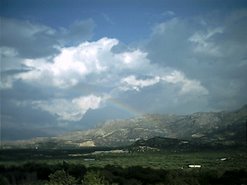Bahman Farmanara, Booye kafoor, atre yas και Tall shadows of the wind Death surrounds Bahman, a director who hasn't made a film in 24 years (he can't get past the censors). He's working on a documentary, for Japanese TV, on Iranian burial practices. On the anniversary of his wife's death, a hitchhiker tells him a story of spousal abuse and infant mortality, he discovers that someone has been buried in his plot next to his wife, and he needs the help of his attorney, a well-connected fixer. He dreams of death, even as he investigates it for his film. His niece's husband, a well-known writer, fails to return home; he searches hospitals for an unclaimed body. His heart disease is flaring up. Is he prepared for death? Is that all that's left? Καταπληκτική η μουσική του Ahmad Bejman
Tall shadows of the wind (1979) Ένα περίεργο θρίλερ, με ένα σκιάχτρο που τρομοκρατεί το χωριό. Ο ήρωας που πάει να το αψηφήσει πεθαίνει στο τέλος.Based on a short story by Houshang Golshiri, who also collaborated with director Bahman Farmanara on his breakout feature Prince Ehtejab (1974), this film centers on mysterious and chilling events that take place in a village. A group of superstitious inhabitants have erected a scarecrow for protection but soon find themselves terrorized by it. Made at the end of the Shah’s reign, the film offers a metaphorical reflection on power relations — how people create their own idols who turn around to terrorize them. The film’s alleged political message was found so dangerous that it was banned both pre- and post-revolution. It was presented to great acclaim in Cannes Film Festival’s Critics’








No comments:
Post a Comment